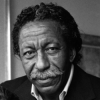Gordon Parks

Gordon Parks
Gordon Parkswas a noted American photographer, musician, writer and film director, who became prominent in U.S. documentary photojournalism in the 1940s through 1970s—particularly in issues of civil rights, poverty and African-Americans—and in glamour photography. As the first famous pioneer among black filmmakers, he was the first African-American to produce and direct major motion pictures—developing films relating the experience of slaves and struggling black Americans, and creating the "blaxploitation" genre. He is best remembered for his iconic photos of poor Americans...
NationalityAmerican
ProfessionPhotographer
Date of Birth30 November 1912
CityFort Scott, KS
CountryUnited States of America
I don't try to make the first move; I always wait for them to make it. He was trying to go for my legs, and that's something I've worked on countering.
There's another horizon out there, one more horizon that you have to make for yourself and let other people discover it, and someone else will take it further on, you know.
The man at Kodak told me the shots were very good and if I kept it up, they would give me an exhibition. Later, Kodak gave me my first exhibition.
Washington, D.C. in 1942 was not the easiest place in the world for a Negro to get along.
Enthusiasm is the electricity of life. How do you get it? You act enthusiastic until you make it a habit.
I saw that the camera could be a weapon against poverty, against racism, against all sorts of social wrongs. I knew at that point I had to have a camera.
Nothing came easy. I was just born with a need to explore every part of my mind. And with long searching and hard work, I became devoted to my restlessness.
You have a 45mm automatic pistol on your lap, and I have a 35mm camera on my lap, and my weapon is just as powerful as yours. (To Black Panther militant Eldridge Cleaver)
The subject matter is so much more important than the photographer.
I've been asked if I think there will ever come a time when all people come together. I would like to think there will. All we can do is hope and dream and work toward that end. And that's what I've tried to do all my life.
The camera could be a very powerful instrument against discrimination, against poverty, against racism.
If you don't have anything to say, your photographs aren't going to say much.
At first I wasn't sure that I had the talent, but I did know I had a fear of failure, and that fear compelled me to fight off anything that might abet it.
Think in terms of images and words. They can be mighty powerful when they are fitted together properly.